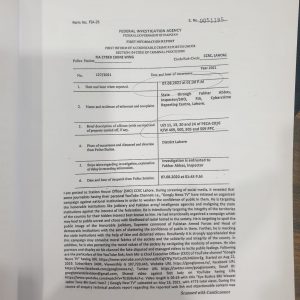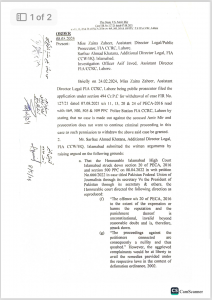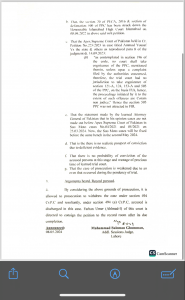LAHORE: The Federal Investigation Agency (FIA) has withdrawn charges against journalists Amir Mir and Imran Shafqat, initially instigated under the political climate fostered by former Prime Minister Imran Khan’s administration. This decision follows a directive from the Supreme Court of Pakistan aimed at discontinuing politically motivated prosecutions against journalists.


On August 7, 2021, Amir Mir and Imran Shafqat were arrested under a cloud of controversy. Amir Mir, CEO of Googly News TV, was intercepted while en route to his office, and personal items such as two phones and a laptop were seized. Imran Shafqat was detained at his home, with his phone confiscated during the arrest. The FIR registered against them cited charges under the Prevention of Electronic Crimes Act, 2016, including electronic forgery and transmitting malicious code, compounded by accusations under the Pakistan Penal Code for defamation and causing public mischief.
“The accused have been involved in a campaign that appears to target the integrity of national institutions, purportedly causing harm to the reputation of state bodies and leading figures within the government,” the FIR noted, raising concerns about a potential agenda to destabilize public confidence.
Following his arrest, Amir Mir filed a petition, challenging the FIA’s actions as a targeted campaign against him. In his letter withdrawing from the Supreme Court case, Mir expressed a poignant lack of hope in obtaining justice, citing the influence of “invisible” powers over the legal processes.

“I am compelled to withdraw from this case as the forces aligned against me have demonstrated a capacity to manipulate judicial proceedings, rendering my efforts to seek redress futile,” Mir wrote.
The Supreme Court’s involvement was crucial. It mandated the withdrawal of the cases, highlighting the misuse of legal provisions against journalists. The court’s decision aligned with earlier judgments that questioned the constitutional validity of certain sections of PECA used to levy charges against Mir and Shafqat.
“The sections under which these charges were filed have been found unconstitutional and excessively punitive in cases involving freedom of expression,” the court observed, facilitating a reassessment of the legal framework used against journalists.
The withdrawal of these charges marks a watershed moment for media freedom in Pakistan. It not only rectifies individual injustices but also sets a precedent emphasizing the importance of journalistic independence and the protection of media personnel from politically motivated charges.
The Islamabad High Court had previously struck down several provisions of PECA, particularly noting the unconstitutionality of sections utilized against Mir and Shafqat. This legal refinement has helped clarify and safeguard the legal rights of journalists against undue government interference.
“The nullification of these charges reaffirms the judiciary’s commitment to upholding the constitution and protecting civil liberties against arbitrary and politically motivated legal actions,” the Islamabad High Court declared.
This official withdrawal serves not just as a correction of an overreach but as a deterrent against potential future misuses of power. It underscores the judiciary’s role in maintaining checks and balances in the governance framework, especially concerning the freedom of the press.


The FIA’s decision to drop the charges against Amir Mir and Imran Shafqat is a significant victory for press freedom and a crucial step towards reinforcing democratic norms in Pakistan. This development is expected to encourage more robust protections for journalists and may influence how authorities handle similar cases in the future, ensuring that such abuses of power are less likely to occur.
By ensuring accountability and rectifying missteps, Pakistan can better uphold its commitment to democratic principles and human rights, particularly the freedom of speech and expression, which are foundational to any vibrant democracy. This case serves as a potent reminder of the ongoing need for vigilance and advocacy to protect these rights.

